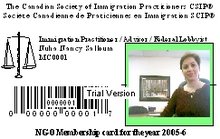Volpe to tackle issue of illegal immigration
He will present his options to cabinet; But amnesty for undocumented workers is not on the table, minister says
ELIZABETH THOMPSON
The Gazette
October 11, 2005
1 2 NEXT >>
CREDIT: TOM HANSON, CP
"Whether they are in the hospitality industry, the construction industry, in manufacturing, quite frankly, it doesn't matter. They're here. So we have to find a way to bring them into the regular mainstream," Immigration Minister Joe Volpe said.
The federal government is poised to tackle the thorny problem of what to do with tens of thousands of undocumented immigrants who are living illegally in Canada, says federal Citizenship and Immigration Minister Joe Volpe.
In an interview with The Gazette, Volpe said he has drafted a number of options designed to "regularize" undocumented workers and is preparing to bring them to cabinet.
"I don't want to discuss all of the options because I've got to do that with my cabinet colleagues first," he explained. "Let it suffice to say that I have several options of regularization that I want to debate."
While Volpe was tight-lipped about what options he is considering, granting a blanket amnesty to those living illegally in Canada is not on the table.
The problem of undocumented immigrants living illegally in Canada is a tricky and complex one for the federal government. While some may be in the legal shadows for a reason, many others are hardworking individuals doing jobs that Canadian businesses need done, but are not legally in the country and are not paying taxes on their earnings.
Further complicating the issue is the perception that those who enter Canada illegally are jumping the queue while others take months and even years to be allowed to immigrate.
Even knowing how many undocumented workers are in the country is a challenge, Volpe admits.
Speaking to reporters in February, Volpe said estimates ranged from 10,000 to 120,000.
In last week's interview with The Gazette, Volpe didn't even offer any figures.
"The thing about undocumented or out-of-status people is that you can't count them. You don't know where they are. Like everybody knows who they are, where they are, but they don't come in and say, here I am."
Canada's problem with undocumented workers living illegally in the country pales in comparison to that of the United States where an estimated 1,000 Mexican workers cross into the country daily, Volpe pointed out.
Part of what has exacerbated the problem is the current selection criteria for immigrants which put the emphasis on candidates with university degrees, Volpe said. While attracting people with academic credentials is good, he said, the system is so rigid that many of those without university degrees have difficulty getting into Canada legally.
"Because we didn't build in other flexibility, as the economy developed, the economy attracted people over here that our system wasn't capable of dealing with," he explained. "So they are here, out of status."
Currently, they are working in a variety of different sectors of the economy, he said.
"Whether they are in the hospitality industry, the construction industry, in manufacturing, quite frankly, it doesn't matter. They're here. So we have to find a way to bring them into the regular mainstream."
Volpe also played down the idea that regularizing undocumented workers will reward them for having bypassed Canada's regular immigration system.
"If we think in terms of these people as being queue jumpers, it will be more difficult. Because everybody thinks that they are cheaters when they do that. Keep in mind that the system for processing these people wasn't equipped to process them and the economic system was inviting them."
While Volpe has yet to bring the question to cabinet, he said he has already started to address it.
"I've got a plan. What I have started to do with the plan is to build coalitions. From labor, business and community groups, NGOs (non-governmental organizations), in order to see how we can best resolve this. But it is unfair to say that the plan is either complete or a fait accompli."
Volpe says he is also working on ways to regionalize Canada's immigration, encouraging newcomers to settle in different provinces and cities across the country.
"If you go anywhere in Canada they will tell you that part of the fix is that you can't possibly have people come to Canada and all of them end up in southern Ontario. Because then that doesn't do the rest of the country any good. So the regionalization of the benefits of immigration are a real challenge."
The key to achieving that is to work with provinces, cities, business and labor, Volpe said.
"You've got to build partnerships. Partnerships with the provinces, partnerships maybe indirectly with cities and larger communities like regional development groups, economic development agencies, partnerships with unions and employer groups.
''So all of these things have to be done so that you can bring immigration, which is a Canada-wide program, bring it to bear in the places where it can have the biggest impact."
Meanwhile one area where many groups working with refugees would like to see progress - having the government fulfill its promise to institute a refugee appeal process - is one area in which it doesn't appear that much progress has been made.
"Nothing is ever dead," responded Volpe when asked if the appeal process was dead.
"But I think it is fair to say that all of the facts and figures to justify whether to move ahead with it aren't completely analyzed."
Tuesday, October 11, 2005
Subscribe to:
Comments (Atom)

